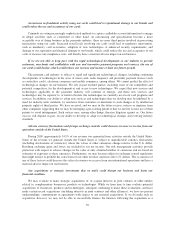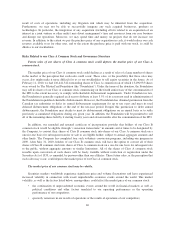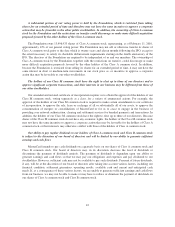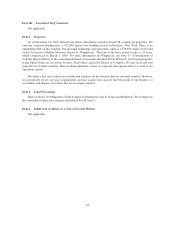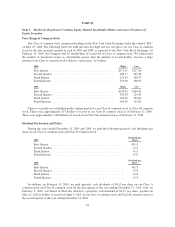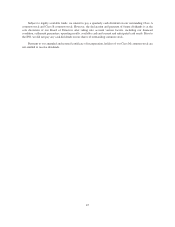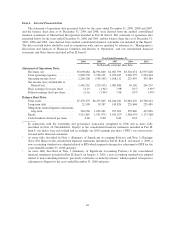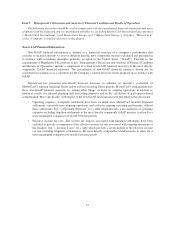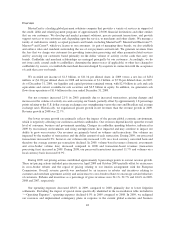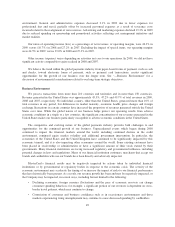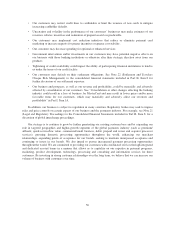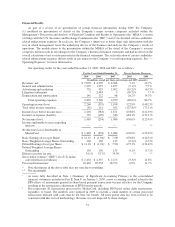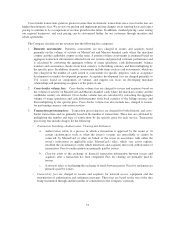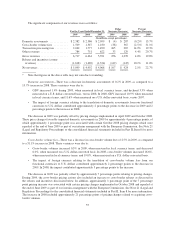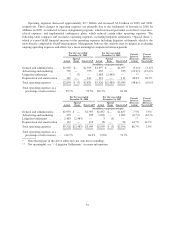MasterCard 2009 Annual Report Download - page 59
Download and view the complete annual report
Please find page 59 of the 2009 MasterCard annual report below. You can navigate through the pages in the report by either clicking on the pages listed below, or by using the keyword search tool below to find specific information within the annual report.environment. General and administrative expenses decreased 3.1% in 2009 due to lower expenses for
professional fees and travel, partially offset by increased personnel expenses as a result of severance costs
incurred related to the realignment of our resources. Advertising and marketing expenses declined 19.2% in 2009
due to reduced spending on sponsorship and promotional activities reflecting cost management initiatives and
market realities.
Our ratios of operating income (loss) as a percentage of net revenues, or operating margins, were 44.3% in
2009 versus (10.7%) in 2008 and 27.2% in 2007. Excluding the impact of special items, our operating margins
were 44.5% in 2009, versus 39.0% in 2008 and 27.3% in 2007.
Other income (expense) varies depending on activities not core to our operations. In 2009, we did not have
significant activity comparable to gains realized in 2008 and 2007.
We believe the trend within the global payments industry from paper-based forms of payment, such as cash
and checks, toward electronic forms of payment, such as payment card transactions, creates significant
opportunities for the growth of our business over the longer term. See “—Business Environment” for a
discussion of environmental considerations related to our long-term strategic objectives.
Business Environment
We process transactions from more than 210 countries and territories and in more than 150 currencies.
Revenue generated in the United States was approximately 45.5%, 47.2% and 49.7% of total revenues in 2009,
2008 and 2007, respectively. No individual country, other than the United States, generated more than 10% of
total revenues in any period, but differences in market maturity, economic health, price changes and foreign
exchange fluctuations in certain countries have increased the proportion of revenues generated outside the United
States over time. While the global nature of our business helps protect our operating results from adverse
economic conditions in a single or a few countries, the significant concentration of our revenues generated in the
United States makes our business particularly susceptible to adverse economic conditions in the United States.
The competitive and evolving nature of the global payments industry provides both challenges to and
opportunities for the continued growth of our business. Unprecedented events which began during 2008
continued to impact the financial markets around the world, including continued distress in the credit
environment, continued equity market volatility and additional government intervention. In particular, the
economies of the United States and the United Kingdom have continued to be significantly impacted by this
economic turmoil, and it is also impacting other economies around the world. Some existing customers have
been placed in receivership or administration or have a significant amount of their stock owned by their
governments. Many financial institutions are facing increased regulatory and governmental influence, including
potential changes in laws and regulations. Many of our financial institution customers, merchants that accept our
brands and cardholders who use our brands have been directly and adversely impacted.
MasterCard’s financial results may be negatively impacted by actions taken by individual financial
institutions or by governmental or regulatory bodies in response to the economic crisis. The severity of the
economic environment may accelerate the timing of or increase the impact of risks to our financial performance
that have historically been present. As a result, our revenue growth has been and may be negatively impacted, or
the Company may be impacted, in several ways, including but not limited to the following:
• Declining economies, foreign currency fluctuations and the pace of economic recovery can change
consumer spending behaviors; for example, a significant portion of our revenues is dependent on cross-
border travel patterns, which may continue to change.
• Constriction of consumer and business confidence such as in recessionary environments and those
markets experiencing rising unemployment may continue to cause decreased spending by cardholders.
49


